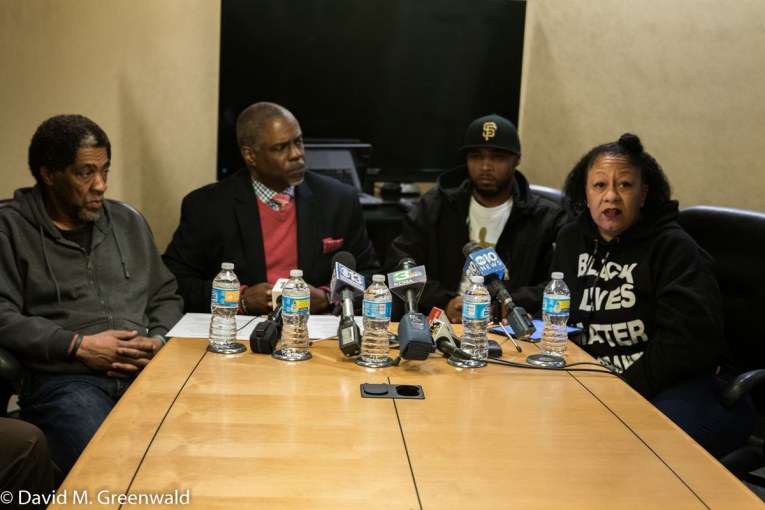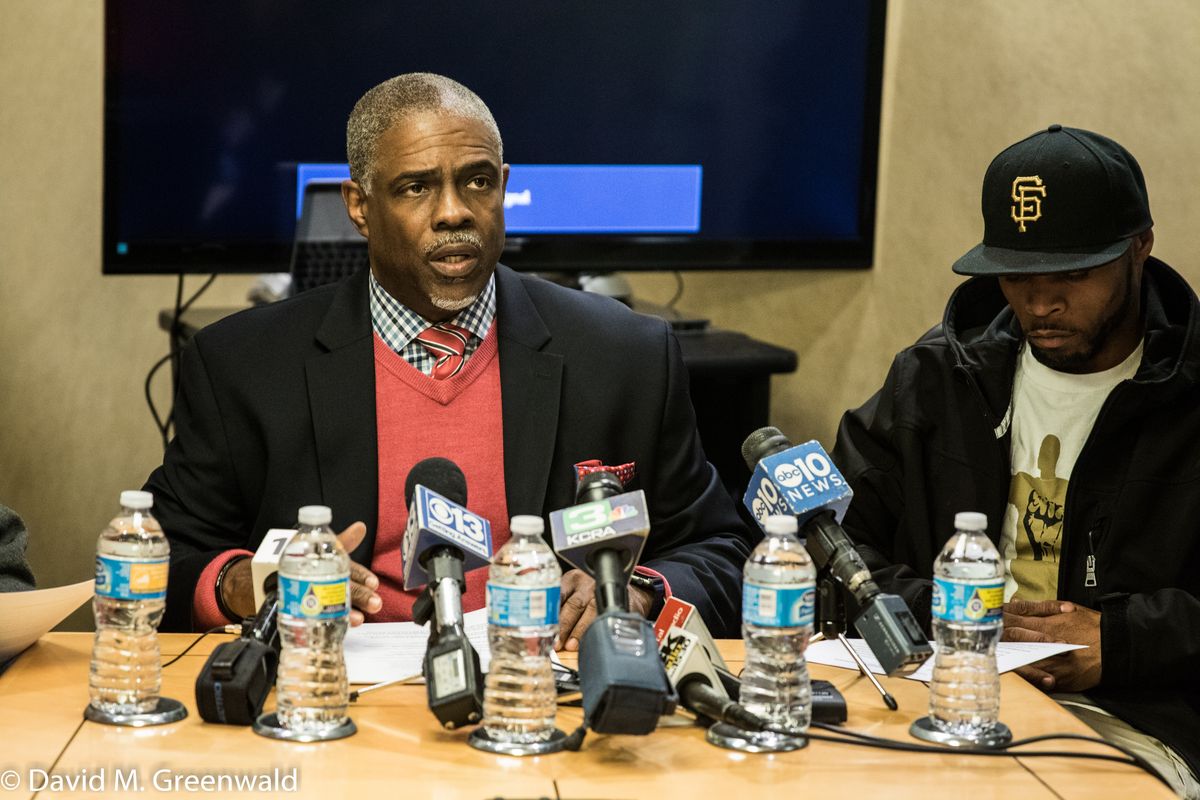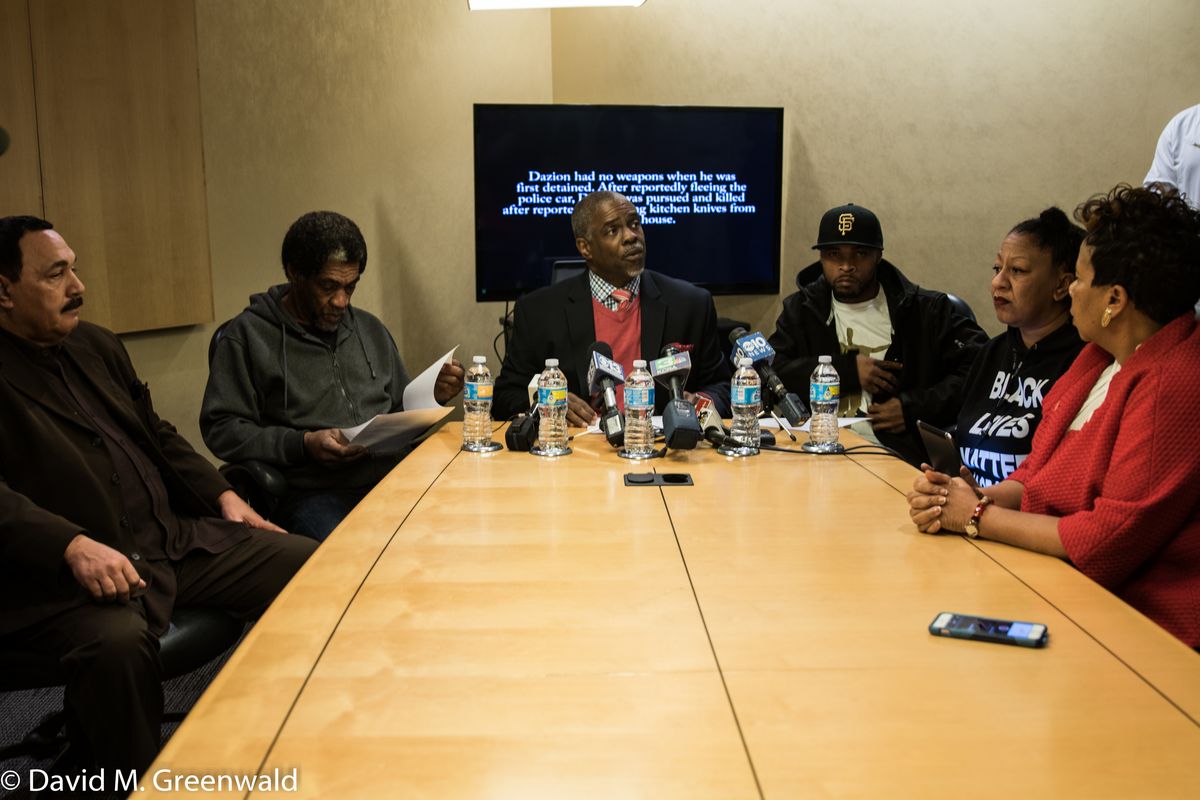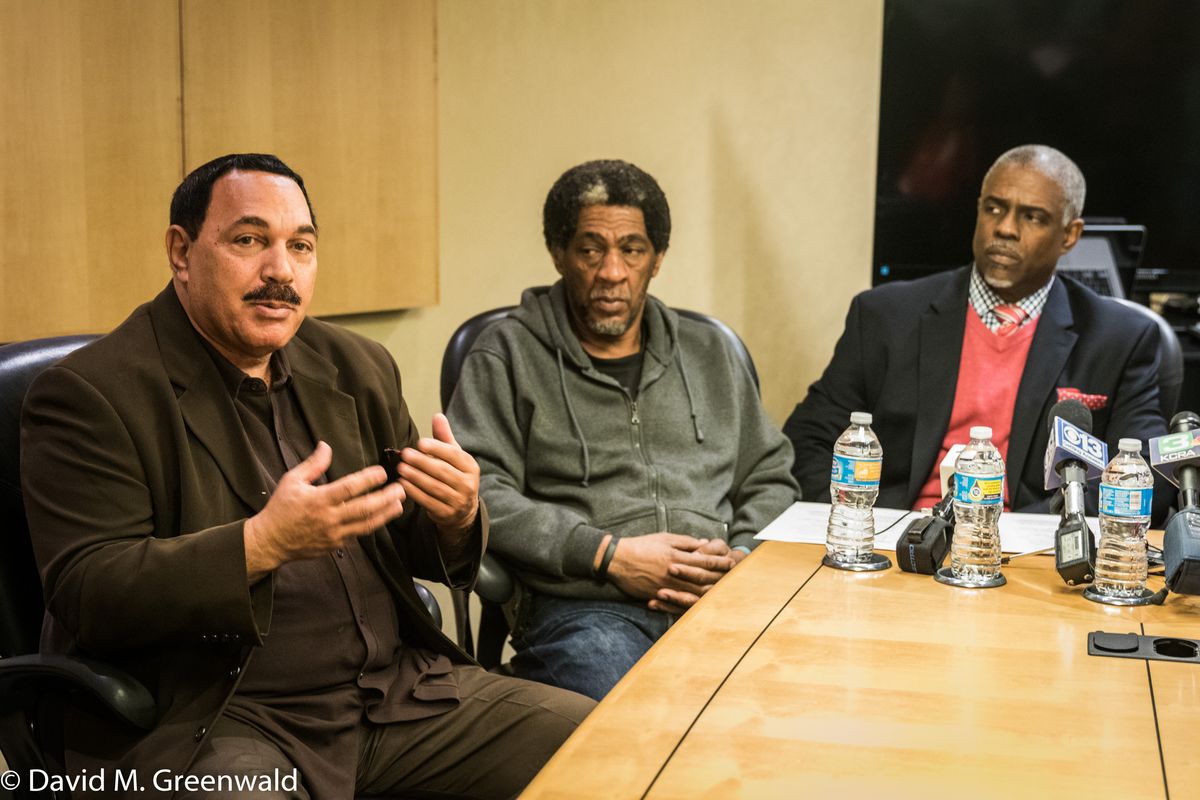

Attorney Mark Harris and the family of Dazion Flenaugh held a press conference in Mr. Harris’ K Street Law Offices just hours before the Sacramento County DA’s Office concluded that officers were justified because they reasonably believed they were defending themselves and others from an imminent threat.
The video, released nine months after the shooting and after the family was told there was no video, shows Mr. Flenaugh being placed in the police vehicle with the officer offering him a ride home. He quickly gets agitated and, when the officer opens the doors, he bolts.
The video shows a strange lack of urgency by the officers to pursue the man and they finally start getting calls from residents. At one point they are heard telling a resident to beat him with a baseball bat. Police called Mr. Flenaugh a “freak” and told a bystander to “just hit him with a baseball bat a couple times” to “mellow him out.”
Twenty minutes later he was shot dead by officers, who claimed he grabbed sharp objects and had concealed weapons.
Mr. Flenaugh, 40, was homeless and suffered from bipolar disorder.
At the press conference, held a few hours before the DA’s announcement, Attorney Mark Harris said he was disappointed to have to be there, stating that they shouldn’t have to go through the media to get the Sacramento Police Department to do the right thing.
He said these issues affect all Sacramentans, “these issues are issues of transparency and accountability that affect every single one of us.”

Mr. Harris said, while the family is pleased with the release, “there are still far more questions that have been left unanswered.” He said, “The family has been denied the police report – that captures the essence of what happened that day.”
“All of this took place within 30 minutes,” he said. “Within 30 minutes Dazion Flenaugh went from walking along the streets of Sacramento to be left dead in the street like an animal.”
Mr. Harris noted that, while the police have not released the toxicology report, the DA’s office has said that narcotics (and meth) were found in his system.
“I think rather than having speculation and conjecture, the right thing to do would be to provide the Flenaugh family immediately with a tox report, the autopsy report, and the police report,” he said.
Mr. Harris called into question how and when Mr. Flenaugh acquired the weapons. They placed him in the vehicle, they did not put cuffs on him, they never had him under arrest. They were heard to say, “What are we going to arrest him for?”
Mr. Harris explained, “When they opened the back of the car, he did what quite honestly I would do, run.” He said, “As an African American male, in the hands of law enforcement, the Supreme Court of the State of Massachusetts has opined you have the desire and ability to run from law enforcement if you feel under duress. That’s exactly what he did.”
He acknowledged that this was Massachusetts and not California. However, he said, “Mr. Flenaugh had the right to flee.”
“He should not have been hunted down for that,” he said, noting the worst he was being accused of at the time was being “a peeping tom, peering into people’s window.” People reported they thought they saw a knife in his hand. Mr. Harris said, “That’s not enough to be shot and killed.”
Mark Harris said they made reference to the fact that they thought he was disturbed. “They called him a ‘freak,’ he said. “And one law enforcement officer commented to the neighbors, just take a baseball bat, hit him two or three times in the head, that will get him right.”
“They knew he wasn’t right,” he said. “They didn’t know why he wasn’t right.” He said, “What law enforcement is supposed to do under those circumstances is de-escalate that situation, not escalate it to the point of death.”
He said, “Absolutely unconscionable the references they made.”

Louis Flenaugh, the father of Dazion Jerome Flenaugh, found out about the shooting at 4 pm in the afternoon, and Mr. Flenaugh was shot around 9 in the morning. “It hit me hard,” he said, as he had trouble getting information about what happened. He said that the chief had told him there were concealed weapons, but he found out it was a pocket knife. “He was homeless, he was on the street, and he had a pocket knife for protection.”
They portrayed him like he was a criminal, he said, “People who listened to it on the news would think, well they just caught another THUG.” Mr. Flenaugh said, “He wasn’t that way. He wasn’t that at all.”
Damon Flenaugh said that when he heard about the shooting, “I felt helpless.”

“What do you do when law enforcement kills someone you love?” he asked. “You go tell the police on the police? Are they really going to do something about it?
“When I watched the video, the callous attitude of each and every police officer that was present,” he said. “Some of the most inhumane people I’ve met. These are the people that are supposed to be policing us. Not one of them cared about my brother’s life.
“Nobody thought that my brother’s life was worth something, nobody,” he said. He was shot 16 times, hit 7.
Tanya Faison of Black Lives Matter said there are more questions than answers after the video. “Why is the Sacramento Police Department saying that it’s okay to taunt, name call, and react off of their egos and hunt down community members that are under stress?”

She called on the elected officials to step up and answer for these questions.
“Why did the city lie and say that there was no video and then later admit that there was?” she asked. “After nine whole months we have questions, we still need answers and we’re still wondering when are we going to start seeing some accountability.”
Mark Harris pointed out that “there’s transparency and then there’s accountability. You have to see what people are doing before you hold them accountable.”
Richard Owen, co-chair of Law Enforcement Accountability Directive (LEAD), said, “We’re very concerned. Subsequent to LEAD getting involved, the police department has created a policy governing body cameras, within that policy believe it or not, police officers are given discretion as to when they can turn the camera on and off.”
He said they would fight them in court on that because they don’t think officers ought to have discretion about that. “If officers can turn it off at critical moments (as they did in this case apparently) that means that evidence is being denied to the people about what actually transpired,” he said.
He said the action that has occurred “is not enough.” He is particularly concerned “about the words that were used in this case. Words matter. Words have meaning otherwise we wouldn’t use them.”

Mr. Owen noted that Mr. Flenaugh was calm and the moment he was called a freak, he started getting agitated, “as anyone would.”
Betty Williams, head of the Sacramento NAACP, said, “NAACP is concerned about the culture of law enforcement that they’re doing this again. We shouldn’t be at this table again.”
The mention of “the freak” and the “baseball bat,” she said, “tells you the culture of law enforcement.”
“Does it only happen with African Americans?” she asked. “It appears to be.” She added that she is happy with city council’s moves, “but it hasn’t gone far enough.”

Mark Harris joined in, “I don’t remember too many press conferences in Sacramento when some Caucasian is killed by law enforcement.” While that act, he said “doesn’t happen very often”… “my impression is information is a lot more forthcoming. It shouldn’t take a court order to get the city of Sacramento to the human thing, that’s all we’re asking for. Why is it that African Americans have to beg for what everyone else just takes for granted?”
Damon Flenaugh asked, “Is that procedure to handcuff a dead body?”
Mark Harris explained that when Dazion Flenaugh was bleeding out on the sidewalk, “he lay dying in the street, there was no attempt to revive him, there was attempt to assess whether he was dead or alive. He had an involuntary jerk and they thought he – they were getting ready to open fire on him again.”
“This is just inhumane, you wouldn’t treat an animal this way,” he said. “Then they tried to cuff him and there was a discussion as to whether they should cuff him behind or in front. He’s lying on the street, bleeding out and these inhumane folks are having this kind of discussion.”
“This incident is heartbreaking and has impacted the family, community and our organization,” Interim Police Chief Brian Louie said in a statement. “The officers involved in this incident acted courageously to protect the citizens of our community. I am very proud of the work these women and men do daily, serving our city.”
—David M. Greenwald reporting
